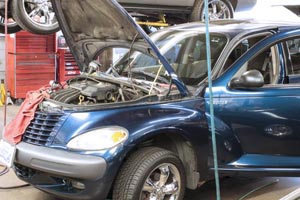Timing Belt Service

What is the difference between a timing chain and a timing belt?
In the 70’s and 80’s timing chains, made of chain links, were in most cars. Rubber timing belts became popular in the 90’s.
The difference is as it sounds: a chain is made of interlinking metal pieces, is heavier, stronger and makes more noise. It is also lasts longer. A timing belt is less expensive, is serviceable, but needs to be replaced more often than a timing chain. You can hear the noise made by the chain when the car is running but the timing belt rarely makes any noise.
Timing belts must be replaced at the manufacturer's recommended distance and/or time periods. Failure to replace the belt can result in complete breakdown or catastrophic engine failure, especially in interference engines. The owner's manual maintenance schedule is the source of timing belt replacement intervals, typically every 60,000 to 100,000 miles. It is common to replace the timing belt tensioner at the same time as the belt is replaced.
The usual
failure modes of timing belts
are either stripped teeth (which leave a smooth section of belt where the drive cog will slip) or delamination and unraveling of the fiber cores.Timing chains do not have a recommended replacement interval, basically considered to last the life of the engine with proper maintenance and operation.
We’re moving back to timing chains. There has been a trend the last several years with many manufacturers moving from belts—back to chains. Technology is allowing this without giving up gas mileage or performance while reducing the noise.
If you’re wondering about your make and model—please feel free to give me a call 909.981.6844.

